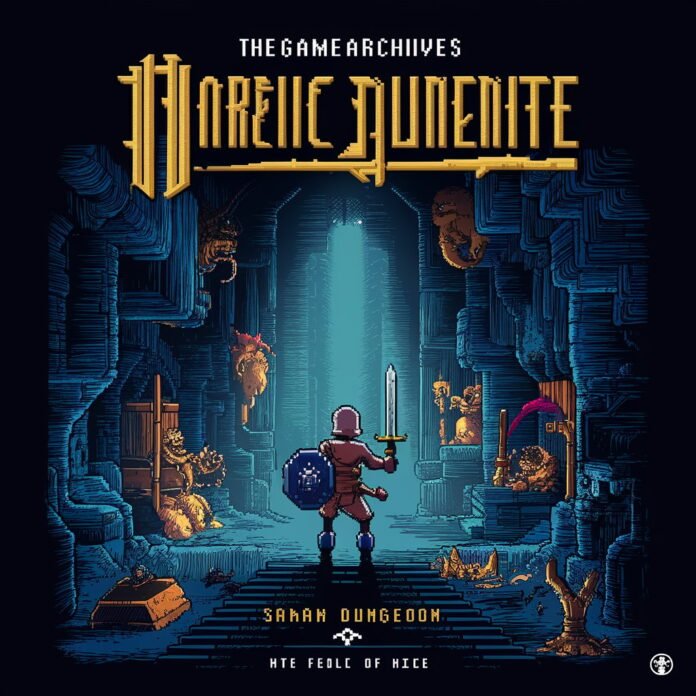The digital landscape of gaming history is vast and ever-expanding, filled with forgotten classics, revolutionary titles, and hidden gems waiting to be rediscovered. From the Website: TheGameArchives serves as your curated guide through this expansive collection, offering in-depth explorations of the games that shaped the industry and the stories behind their creation. Whether you’re a nostalgic veteran or a curious newcomer, this series will transport you through decades of interactive entertainment, uncovering the innovations, controversies, and cultural impacts that define gaming as we know it today.
1. Lost Legends: Forgotten Games That Deserve a Second Look
Every era of gaming has its blockbusters, but what about the titles that slipped through the cracks? In this section, we unearth underappreciated masterpieces—games like Psychonauts (which found cult success after a rocky launch) or Beyond Good & Evil (a critical darling that struggled commercially). We examine why these games failed to find an audience initially, how they’ve been reevaluated over time, and why they’re worth playing today. From obscure RPGs to innovative arcade experiments, these lost legends prove that greatness isn’t always measured in sales.
2. The Making Of: Behind the Scenes of Iconic Games
Some games change the industry overnight, but their development stories are often just as gripping as the games themselves. Here, we dive into the creation of landmark titles like Super Mario 64, The Last of Us, and Minecraft, exploring the technical hurdles, creative breakthroughs, and sometimes chaotic development cycles that brought them to life. How did Final Fantasy VII’s shift to 3D redefine RPGs? What near-disasters were avoided during Halo: Combat Evolved’s development? These behind-the-scenes stories reveal the passion and chaos that fuel gaming’s most unforgettable experiences.
3. Genre Evolution: How Classic Formulas Have Transformed
Game genres don’t stay static—they evolve, merge, and occasionally reinvent themselves entirely. This section traces the lineage of genres like platformers (from Donkey Kong to Celeste), survival horror (from Alone in the Dark to Resident Evil Village), and open-world adventures (from The Legend of Zelda to Elden Ring). We analyze the key innovations that pushed each genre forward, the missteps that led to dead ends, and how modern indies and AAA studios continue to reinterpret these foundational ideas. Understanding these evolutions helps us appreciate how far gaming has come—and where it might go next.
4. Hardware History: The Consoles and Tech That Changed Gaming
Games need platforms, and the hardware they run on has shaped design in ways many players never consider. From the NES’s revival of the industry to the PlayStation 2’s DVD-driven dominance, and from the Wii’s motion-control revolution to the current battle between PC, Xbox, and PlayStation, we break down how consoles and tech advancements have influenced game design. Why did the Sega Dreamcast fail despite its innovations? How did smartphones democratize gaming while also introducing new challenges? This section connects the dots between silicon and software, showing how hardware decisions ripple through gaming history.
5. Cultural Impact: When Games Broke Into the Mainstream
Gaming isn’t just a hobby—it’s a cultural force that has reshaped entertainment, art, and even social movements. Here, we examine moments when games transcended their medium: Pokémon becoming a global phenomenon, Fortnite redefining live events, or The Witcher 3 proving games could deliver narratives as rich as premium TV. We also explore controversies like Grand Theft Auto’s moral panics and Animal Crossing’s unexpected role during the pandemic. These case studies show how games reflect and influence the world beyond the screen.
6. Preserving the Past: The Fight to Save Gaming History
As games age, their preservation becomes increasingly urgent—yet many are at risk of being lost forever due to licensing issues, decaying hardware, or corporate neglect. This section highlights the archivists, emulator developers, and fan communities racing to save retro games before they vanish. Why was the Silent Hill 2 source code nearly lost? How do museums like the Strong Museum of Play protect gaming heritage? We also discuss the legal and ethical debates around preservation, from ROM sites to official re-releases, and why this work matters for future generations.
Closing Thoughts: Why Gaming History Matters
From the Website: TheGameArchives isn’t just a nostalgia trip—it’s a testament to how games have grown as an art form, a industry, and a shared cultural language. By revisiting these stories, we gain a deeper understanding of the creativity, risks, and occasional luck that built the games we love. More importantly, we ensure that the pioneers and forgotten innovators of gaming get the recognition they deserve. After all, to see where gaming is going, we must first understand where it’s been.



